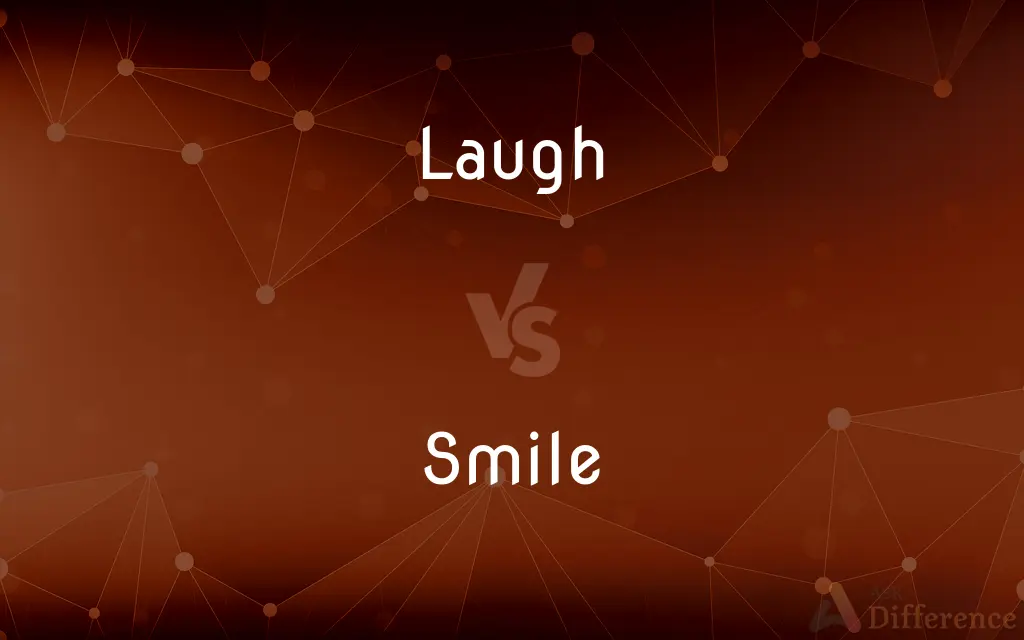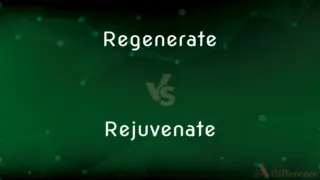Laugh vs. Smile — What's the Difference?
Edited by Tayyaba Rehman — By Fiza Rafique — Updated on September 30, 2023
A "Laugh" is a vocal expression of amusement or joy, often loud. A "Smile" is a silent facial expression, signifying pleasure, favor, or amusement by an upward turning of the corners of the mouth.

Difference Between Laugh and Smile
Table of Contents
ADVERTISEMENT
Key Differences
"Laugh" and "Smile" both indicate positive emotions or reactions, but they manifest in distinct ways. When someone laughs, it involves a vocal and often audible expression of joy, amusement, or even nervousness. Laughter can range from a subtle chuckle to a hearty guffaw, but it's primarily an audible sign of mirth or another emotion. Laughs can be spontaneous or sometimes even forced, depending on the context.
In contrast, a "Smile" remains a silent facial gesture, characterized by the upward curving of the mouth's corners. Smiles can be brief or lingering and denote a variety of sentiments, from joy and pleasure to politeness and understanding. While laughs are usually spontaneous reactions to something funny or surprising, smiles can be both spontaneous and deliberate, often used in social contexts as a form of non-verbal communication.
It's interesting to note that while both actions - laughing and smiling - denote positivity, they can sometimes be used in sarcasm or irony. For instance, a laugh can occasionally be mocking, and a smile can sometimes be insincere or even malevolent.
Moreover, cultural nuances play a role in how these expressions are perceived. In certain cultures, laughing out loud in public, especially for women, might be frowned upon, while in others, a smile might be a customary gesture when greeting a stranger. Both laughing and smiling are universal human reactions, but their appropriateness can vary based on cultural or situational contexts.
Comparison Chart
Nature
Audible expression
Silent facial expression
ADVERTISEMENT
Indication
Amusement, joy, or nervousness
Pleasure, favor, or amusement
Common Use
Reaction to humor or surprise
Gesture in greetings, understanding, or joy
Complexity
Can range from chuckles to loud guffaws
Ranges from subtle to broad grins
Potential for Insincerity
Can be mocking or forced
Can be polite, customary, or insincere
Compare with Definitions
Laugh
An audible expression indicating amusement or joy.
He let out a hearty laugh when he heard the joke.
Smile
A curvature of the lips indicating positivity.
His smile made her day brighter.
Laugh
A vocal reaction to something funny or unexpected.
The comedian made the entire room burst into laughter.
Smile
A silent display of amusement or pleasure.
He gave a shy smile when complimented.
Laugh
An act of displaying joy through sound.
Her laugh was infectious, lighting up the room.
Smile
A facial cue often used in social interactions.
She greeted everyone with a bright smile.
Laugh
A sound resulting from deep happiness or nervousness.
Her nervous laugh was evident during the interview.
Smile
A smile is formed primarily by flexing the muscles at the sides of the mouth. Some smiles include a contraction of the muscles at the corner of the eyes, an action known as a Duchenne smile.
Laugh
To express certain emotions, especially mirth or delight, by a series of spontaneous, usually unarticulated sounds often accompanied by corresponding facial and bodily movements.
Smile
A facial expression characterized by an upward curving of the corners of the mouth and indicating pleasure, amusement, or derision.
Laugh
To show or feel amusement or good humor
An experience we would laugh about later on.
Smile
To have or form a smile.
Laugh
To feel or express derision or contempt; mock
I had to laugh when I saw who my opponent was.
Smile
To look with favor or approval
Fortune smiled on our efforts.
Laugh
To feel a triumphant or exultant sense of well-being
You won't be laughing when the truth comes out.
Smile
To express cheerful acceptance or equanimity
We smiled at the bad weather and kept going.
Laugh
To produce sounds resembling laughter
Parrots laughing and chattering in the trees.
Smile
To express with a smile
Grandmother smiled her consent.
Laugh
To affect or influence by laughter
Laughed the speaker off the stage.
Laughed the proposal down.
Smile
A facial expression comprised by flexing the muscles of both ends of one's mouth, often showing the front teeth, without vocalisation, and in humans is a common involuntary or voluntary expression of happiness, pleasure, amusement, goodwill, or anxiety.
She's got a perfect smile.
He has a sinister smile.
She had a smile on her face.
He always puts a smile on my face.
Laugh
To say with a laugh
He laughed his delight at the victory.
Smile
(figurative) Favour; propitious regard.
The smile of the gods
Laugh
The act of laughing.
Smile
A drink bought by one person for another.
Laugh
The sound of laughing; laughter.
Smile
(ambitransitive) To have (a smile) on one's face.
When you smile, the whole world smiles with you.
I don't know what he's smiling about.
She smiles a beautiful smile.
Laugh
(Informal) Something amusing, absurd, or contemptible; a joke
The solution they recommended was a laugh.
Smile
(transitive) To express by smiling.
To smile consent, or a welcome
Laugh
Often laughs(Informal) Fun; amusement
Went along just for laughs.
Smile
(intransitive) To express amusement, pleasure, or love and kindness.
Laugh
An expression of mirth particular to the human species; the sound heard in laughing; laughter.
His deep laughs boomed through the room.
Smile
(intransitive) To look cheerful and joyous; to have an appearance suited to excite joy.
The sun smiled down from a clear summer sky.
Laugh
Something that provokes mirth or scorn.
Your new hat's an absolute laugh, dude.
Smile
(intransitive) To be propitious or favourable; to countenance.
The gods smiled on his labours.
Laugh
A fun person.
Smile
To express amusement, pleasure, moderate joy, or love and kindness, by the features of the face; to laugh silently.
He doth nothing but frown. . . . He hears merry tales and smiles not.
She smiled to see the doughty hero slain.
When last I saw thy young blue eyes, they smiled.
Laugh
(intransitive) To show mirth, satisfaction, or derision, by peculiar movement of the muscles of the face, particularly of the mouth, causing a lighting up of the face and eyes, and usually accompanied by the emission of explosive or chuckling sounds from the chest and throat; to indulge in laughter.
There were many laughing children running on the school grounds.
Smile
To express slight contempt by a look implying sarcasm or pity; to sneer.
'T was what I said to Craggs and Child,Who praised my modesty, and smiled.
Laugh
To be or appear cheerful, pleasant, mirthful, lively, or brilliant; to sparkle; to sport.
Smile
To look gay and joyous; to have an appearance suited to excite joy; as, smiling spring; smiling plenty.
The desert smiled,And paradise was opened in the wild.
Laugh
To make an object of laughter or ridicule; to make fun of; to deride; to mock.
Don't laugh at my new hat, man!
Smile
To be propitious or favorable; to favor; to countenance; - often with on; as, to smile on one's labors.
Laugh
(transitive) To affect or influence by means of laughter or ridicule.
Smile
To express by a smile; as, to smile consent; to smile a welcome to visitors.
Laugh
(transitive) To express by, or utter with, laughter.
Smile
To affect in a certain way with a smile.
And sharply smile prevailing folly dead.
Laugh
To show mirth, satisfaction, or derision, by peculiar movement of the muscles of the face, particularly of the mouth, causing a lighting up of the face and eyes, and usually accompanied by the emission of explosive or chuckling sounds from the chest and throat; to indulge in laughter.
Queen Hecuba laughed that her eyes ran o'er.
He laugheth that winneth.
Smile
The act of smiling; a peculiar change or brightening of the face, which expresses pleasure, moderate joy, mirth, approbation, or kindness; - opposed to frown.
Sweet intercourseOf looks and smiles: for smiles from reason flow.
Laugh
Fig.: To be or appear gay, cheerful, pleasant, mirthful, lively, or brilliant; to sparkle; to sport.
Then laughs the childish year, with flowerets crowned.
In Folly's cup still laughs the bubble Joy.
No wit to flatter left of all his store,No fool to laugh at, which he valued more.
Smile
A somewhat similar expression of countenance, indicative of satisfaction combined with malevolent feelings, as contempt, scorn, etc; as, a scornful smile.
Laugh
To affect or influence by means of laughter or ridicule.
Will you laugh me asleep, for I am very heavy?
I shall laugh myself to death.
Smile
Favor; countenance; propitiousness; as, the smiles of Providence.
Laugh
To express by, or utter with, laughter; - with out.
From his deep chest laughs out a loud applause.
Smile
Gay or joyous appearance; as, the smiles of spring.
The brightness of their [the flowers'] smile was gone.
Laugh
The sound of laughing
Smile
A facial expression characterized by turning up the corners of the mouth; usually shows pleasure or amusement
Laugh
A facial expression characteristic of a person laughing;
His face wrinkled in a silent laugh of derision
Smile
Change one's facial expression by spreading the lips, often to signal pleasure
Laugh
A humorous anecdote or remark intended to provoke laughter;
He told a very funny joke
He knows a million gags
Thanks for the laugh
He laughed unpleasantly at hisown jest
Even a schoolboy's jape is supposed to have some ascertainable point
Smile
Express with a smile;
She smiled her thanks
Laugh
Produce laughter
Smile
A facial expression formed by turning the corners of the mouth upward.
Her smile was warm and welcoming.
Laugh
A manifestation of amusement or derision.
He couldn't help but laugh at the comical situation.
Smile
A gentle facial gesture indicating recognition or understanding.
With a smile, she acknowledged her friend's advice.
Common Curiosities
Can you smile without laughing?
Yes, a smile is a silent expression and doesn't always lead to laughter.
Can animals laugh or smile?
While some animals display joy or contentment, it's debated whether it's equivalent to human laughter or smiles.
Is laughing always a sign of happiness?
No, people can laugh out of nervousness, irony, or even sarcasm.
Why do people smile during greetings?
Smiling is a universal sign of goodwill and is often used to foster friendly interactions.
Why do we feel better after laughing or smiling?
Both actions release endorphins, which can elevate mood.
Is it possible to identify a fake laugh?
Often, but it can be challenging. Genuine laughter usually involves multiple facial and body muscles.
Can smiles have different meanings across cultures?
Yes, the context and meaning of smiles can vary across cultures.
Why do we laugh at something funny?
It's a spontaneous reaction, often stemming from surprise or the subversion of expectations.
Share Your Discovery

Previous Comparison
Regenerate vs. Rejuvenate
Next Comparison
Zest vs. ZealAuthor Spotlight
Written by
Fiza RafiqueFiza Rafique is a skilled content writer at AskDifference.com, where she meticulously refines and enhances written pieces. Drawing from her vast editorial expertise, Fiza ensures clarity, accuracy, and precision in every article. Passionate about language, she continually seeks to elevate the quality of content for readers worldwide.
Edited by
Tayyaba RehmanTayyaba Rehman is a distinguished writer, currently serving as a primary contributor to askdifference.com. As a researcher in semantics and etymology, Tayyaba's passion for the complexity of languages and their distinctions has found a perfect home on the platform. Tayyaba delves into the intricacies of language, distinguishing between commonly confused words and phrases, thereby providing clarity for readers worldwide.
















































